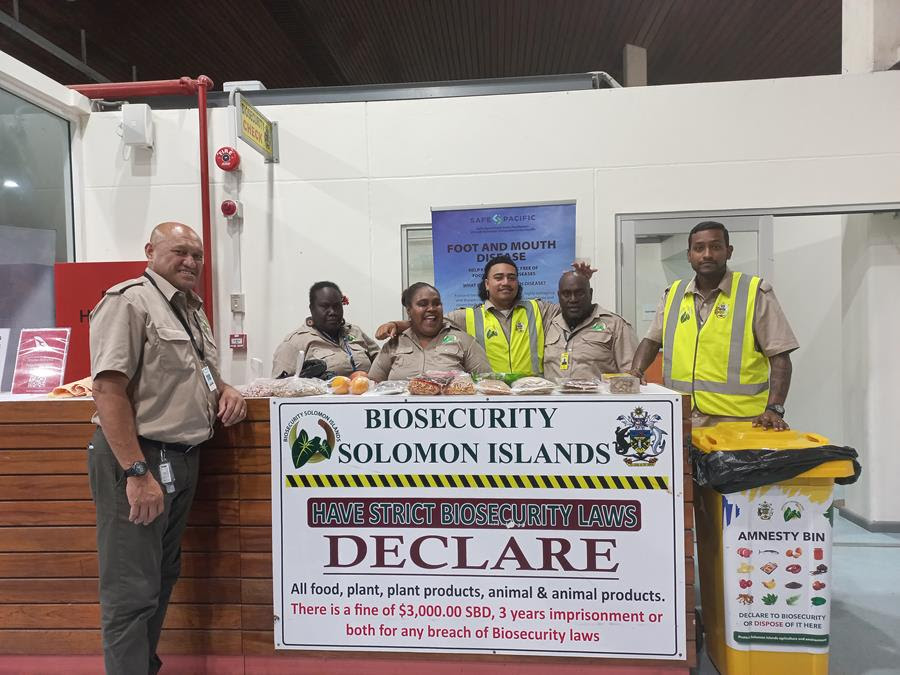Cook Islands bolster Solomon Islands’ biosecurity measures
Wednesday 29 November 2023 | Written by Supplied | Published in Environment, Local, National, Regional, Solomon Islands

Senior Cook Islands biosecurity officer Walter Tangata, left, with a fellow Cook Islands biosecurity officer, Biosecurity Solomon Islands officers and SPC’s biosecurity officer Riten Gosai, right, with the confiscated items. Credit: SPC/23112830
Cook Islands biosecurity officers are in Honiara, Solomon Islands, to provide much-needed reinforcement to the local team due to a significant surge in arrivals for the Pacific Games.
A surge in regional travel has increased the potential risks related to the introduction and spread of harmful pests and diseases in Honiara, says the Pacific Community (SPC).
To effectively mitigate these risks, two biosecurity officers from the Cook Islands have joined Biosecurity Solomon Islands (BSI), actively observing, learning from and assisting in the operations of the local biosecurity team.
In addition to this work, SPC and the Cook Islands biosecurity officers joined the BSI Surveillance team to reinforce the pest detection capabilities through early warning systems, helping replace or strategically install new traps in high-risk areas such as the game venues, games villages and around athletes’ accommodation.
This initiative is funded by the European Union (EU) under the Safe Agricultural Trade Facilitation through Economic Integration in the Pacific (SAFE Pacific) project.
In a statement, senior Cook Islands biosecurity officer Walter Tangata expressed his gratitude, stating, “I want to extend my thanks to SPC and the EU for organising the visit by biosecurity officers from the Cook Islands and the warm welcome extended by BSI.”
“The initial days have been dedicated to observing and understanding the operations of BSI in processing international flights at the airport. It’s different from our approach in the Cook Islands, yet similar in many aspects.”
Tangata highlighted that the knowledge acquired during the visit to Solomon Islands will significantly enhance the capabilities of Cook Islands Biosecurity. This is especially true in reassessing how specific functions can be approached differently within airport and seaport operations, waste management, treatment of risk goods and surveillance programmes.
SPC’s biosecurity officer Riten Gosai said: “The BSI team are stretched across all their areas of work, ensuring effective measures are taken to safeguard both Solomon Islands and the region as participating countries travel to the event and return home. SPC and the Cook Islands Biosecurity officers are providing crucial support to BSI airport operations to cope with the dramatic increase in passenger clearance, baggage screening, search and dealing with non-compliance”.
Gosai highlighted the vulnerability of small island nations to pests and diseases, which, upon introduction into new areas, can harm agriculture, the environment and a country’s unique biodiversity, emphasising the shared responsibility to protect the region from these risks.
“As part of the preparations, BSI, SIBDP and SPC raised awareness with athletes, officials, the travelling public, and volunteers on items prohibited entry into the Solomon Islands, what to declare upon arrival and the importance of adhering to biosecurity rules. Particularly, fresh fruits and vegetables or meat from high-risk countries are a threat to Solomon Islands as they can introduce unwanted foreign plant pests or animal diseases.”
Director of BSI, Francis Tsatsia, welcomed the support of SPC and Cook Islands biosecurity officers, highlighting that this engagement underscores true Pacific spirit and effective collaboration in protecting our countries from exotic biosecurity threats.














































